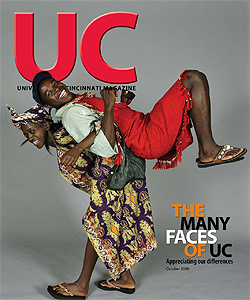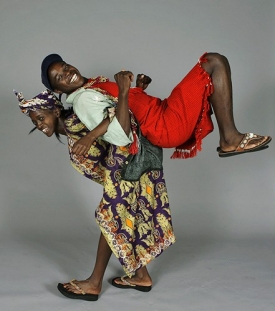Kenyan athletes will use their degrees to help their homeland
by John Bach
Lilian Jelimo won't be at peace until she lives up to her end of the bargain. The 22-year-old UC student remembers vividly the deal she struck with God.
She was two years out of high school with no means of getting to college when the answer finally came to her oft-repeated prayer: "God, if you will just help me find a way to study, I will make a difference in people's lives."
Jelimo had grown weary from watching family members and others from her village -- 8,000 miles away in Kapsabet, Kenya -- die of treatable ailments. The only hospital near her home employs just one physician and two nurses. At least a hundred people a day, she says, line up for care. Some die in line before ever seeing the doctor. "The hospital at my home, oh my gosh, it is just terrible," explains Jelimo. "You make these long lines and you just stay there forever." So many, she says, feel helpless to make a difference because they have no formal medical training.
Hope for Jelimo came in the form of an envelope from the United States. Inside, a letter from the University of Cincinnati informed her that she had won a track scholarship.
Jelimo grew up in a makeshift shack of mud and corrugated sheets of metal. Her family raised enough crops and cattle to send her and her six older siblings to high school, but college was far too expensive. And the Kenyan government only funds students who maintain an "A" in high school. She averaged a "B."
So Jelimo ran. She ran the East African countryside picturing an unlikely dream that, like her cousin, she might also have a shot at a scholarship to a U.S. college. Her legs delivered.
"I was just running," she says. "I didn't have any other hopes at all. When the acceptance letter came from UC, I just sang all day about how gracious God is." Jelimo, a junior, is today a decorated distance runner in the Big East and has her name in UC's record books. Athletic accomplishments, however, hardly compare in importance to her education at UC's College of Nursing.
"What's most important is helping people," she says. "I'm not even thinking of myself. I'm thinking of helping improve the situation back home in Kenya.
"We have people who are really poor there. They don't have food. They don't have good housing. If I can help even 10 people, then I will have done something really good." As badly as Jelimo wanted out of Kenya, there was never any question that she would return. "I like it here," she says of Cincinnati. "Life is really good here. It is comfortable, but I don't consider myself in a good place when a lot of people are still suffering back home."
While Jelimo plans to go back, she hasn't made up her mind as to when. As a nurse, she could, no doubt, help a great deal in Kenya. But as a doctor, she could literally help transform treatment in her village. If she opts for med school, she plans to run professionally for a couple of years to pay her way.
Jelimo's story is amazingly similar to her teammate, fellow Kenyan and friend, Solomon Kessio. The two met at UC, but they grew up only 10 miles apart. Kessio, a senior who is also on an athletic scholarship, has childhood memories of bursting from his mud-hut home in full stride, his twig-like legs carrying him past the rows of corn that allowed his family to send him to school. The 4-year-old Kenyan had two miles of dirt paths and grasslands to put behind him every day if he was going to make it to class by 7 a.m.
By fourth grade, he went to school all day, and a 45-minute lunch break allowed just enough time for little Solomon to dash home for a bit of cornbread and get back for his afternoon session. By the end of every school day, he had clocked roughly eight miles.
"Everyone runs where I'm from," says Kessio, his thick accent revealing he is half a world away from home, a rural highland village near Eldoret, Kenya. That vast distance was never more apparent than during Christmas break 2008 when Kessio stood in track and cross country coach Bill Schnier's office with tears streaming down his face. After four years away from Kenya, the soft-spoken UC runner was overwhelmed and homesick. "As we talked, he started to cry," explains Schnier. Kessio missed his family, and he had no chance of coming up with the $4,000 it would take to go see them. The coach then said five words that were as good a Christmas gift as Kessio could ever have dreamed. "We will get you there," Schnier told him.
Six months later, Solomon Kessio's teammates had raised the funds, and he was on a plane to Kenya for an extended visit with his family as part of an Athletes in Action mission trip. Fellow UC runners kicked in as much as $100 each from their own pocket. Kevin Schwarz, Bus '07, a former teammate, raised $400 by running a race dressed as a cow. Others hosted a fundraiser at Uncle Woody's Pub.
These days, Kessio is finishing his biology degree with hopes of studying animal life in the Serengeti.
Daily life in Cincinnati is incredibly less complex for Kessio, who used to carry a flickering candle 20 meters through pitch-black night to use the bathroom. With no electric, and no indoor plumbing, he bathed in a cold bucket of water.
Despite the difficult conditions, much like Jelimo, Kessio has his mind set on returning permanently. The job he'll be able to get with a UC degree in Kenya will mean wonders to his family, who is working toward building a brick home.
For both students, running has never been about personal glory. Running in Kenya is a way of life. It is a necessity. They ran so they could go to school. At UC, the same is true, but now they also run so that others may have a better life.
"We are a better team because of Solomon and Lilian," says Schnier. "They are great runners. But we are also a better country because of their compassionate spirit. "You tend to base your impression of a country on only a few people. My impression of Kenya is very good."
Link:
UC track and field

 Issue Archive
Issue Archive